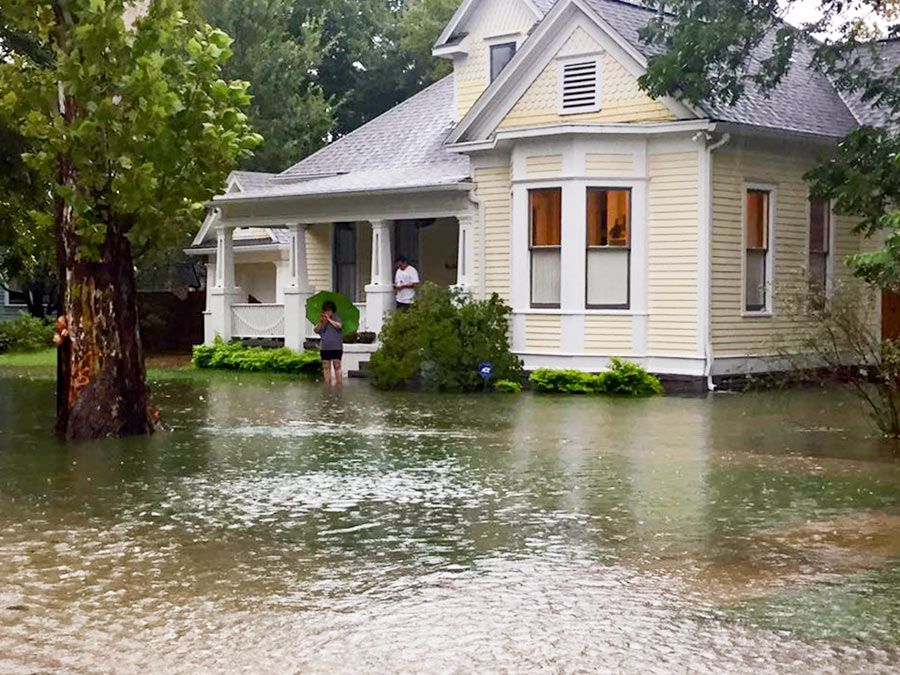UH’S PHONE SURVEY POLLEES WANT TO MAKE FLOOD RECORD A GIVEN IN HOME SALES  Here’s a tidbit from the UH Hobby School of Public Affairs’ new post-Harvey telephone questionnaire: 90 percent of Harris, Fort Bend, Brazoria, and Montgomery County residents who responded think sellers should be required to disclose prior flood damage to their homes and prior flooding in the surrounding neighborhood. Aren’t sellers already obligated to reveal their homes’ flood histories? Well, almost. State law requires most sellers to spill the details — but only if their home was previously occupied (and not if it was foreclosed on or if they’re selling it to execute someone’s will). For developers selling newly-built homes — sometimes in entirely new subdivisions — the rules are foggier: not all surrounding flood designations need to be disclosed to buyers. Among those details that can be withheld: whether the home is located in a flood pool, an area of land prone to inundation when water builds up behind a reservoir dam like that of the Addicks and Barker, as Lise Olsen wrote in the Chronicle last year. [University of Houston Hobby School of Public Affairs] Photo of home at 8th St. and Arlington during Harvey: Swamplot inbox
Here’s a tidbit from the UH Hobby School of Public Affairs’ new post-Harvey telephone questionnaire: 90 percent of Harris, Fort Bend, Brazoria, and Montgomery County residents who responded think sellers should be required to disclose prior flood damage to their homes and prior flooding in the surrounding neighborhood. Aren’t sellers already obligated to reveal their homes’ flood histories? Well, almost. State law requires most sellers to spill the details — but only if their home was previously occupied (and not if it was foreclosed on or if they’re selling it to execute someone’s will). For developers selling newly-built homes — sometimes in entirely new subdivisions — the rules are foggier: not all surrounding flood designations need to be disclosed to buyers. Among those details that can be withheld: whether the home is located in a flood pool, an area of land prone to inundation when water builds up behind a reservoir dam like that of the Addicks and Barker, as Lise Olsen wrote in the Chronicle last year. [University of Houston Hobby School of Public Affairs] Photo of home at 8th St. and Arlington during Harvey: Swamplot inbox





“residents think sellers should be required to disclose prior flood damage to their homes”
.
Because when you ask the question like that people instinctively think “yeah! They should!”. Sure they should. But when you use the word “require”, do they think about what that implies? By government force they must or they are arrested?
.
I’m all for having the seller fill out a sellers disclosure, and having the flooding question on there. Or really whatever question a buyer wants to know. Sellers can answer “yes”, “no”, or “unknown” (as they do now) or just not answer (should be their right). If they lie (and say “no” when it flooded while they owned it) they should be able to be gone after civilly.
.
When I get those questions I answer “Unknown” on everything or leave them blank(or just say I don’t want to fill it out). If the seller isn’t comfortable with that then they have the right to pass on buying the property. But if the government FORCES people to answer those questions I can see lawyers having a field day years from now. What constitutes a home having “flooded”? Some water came in? 1 inch? What constitutes “has the neighborhood flooded” ?
Sellers should be required to disclose EVERYTHING that they know about a property. No exceptions. The real estate professionals get away with way too much in this city. To the detriment of the consumer. End of Story.
@Cody – Arrested? No. But they should lose their real estate license and find another line of work where their greed will not adversely affect those they deal with.
What concerns would there be in forcing insurance companies and aid agencies keeping all claims logged on a publicly accessible database?
after allison, there was this tsarp project that mapped out the extent of the flooding. i assume that fema and other parties are interested enough in where flooding occurred during harvey that a similar project is probably planned or already underway. they used to have a website you could go to and see the tsarp level on a gis map, but i think they took it away when they incorporated the info into the new fema floodplain map. when i bought my house i used the mapping tool here: http://www.harriscountyfemt.org/ to see if my house was in the flood area. i could be wrong, but i was under the impression that the 500 year floodplain layer on that mapping tool corresponds with levels from allison.
maybe that’s not the case but anyways you’d think they could use flood claim locations, bayou level readings, and topo map info to come up with a pretty decent approximation.
Flooding should ALWAYS be notified to prospective buyers, much like flooded vehicles. To do otherwise is not only dishonest but it is also downright immoral. If the legislature doesn’t enact a law to require notification, without exception, then they should all be replaced with those who look out for the public’s good.
@Cody: “But when you use the word ‘require’, do they think about what that implies? By government force they must or they are arrested?”
.
That’s the nature of law. All power flows from the barrel of a gun. But you can probably stay out of the pokey and bullet-free by paying a fine in civil cases like this.
.
I don’t think sellers should have to keep track of this information. It should be public record. No one should be able to say “I don’t know” when asked if a property sustained flood damage.
The pertinent question is not whether the home has flooded. The pertinent question for the prospective home buyer is: Has the home been damaged? and, if so, was the damage repaired?
If a home buyer is worried about flood, then that home buyer should buy flood insurance. Any home can flood. The fact that a home flooded, is not an indication that it may ever flood again. Whether or not a home flooded should not effect your decision to purchase flood insurance.
@Jardinero1: Huh? Past history of flooding is a pretty good indicator of future flood risk. Many homes that flooded in the major 2015 and 2016 flood events also flooded in Harvey.
Why not set up a CARFAX-esque service for flooding? You could data mine building and demo permits to get a sense of where the flood waters went and sell people reports using that data. There are probably lots of other data points that would also be helpful that could be combined in a report. If you are really sneaky, you will get mortgage brokers to include it in the fees as some sort of title-ish report. Then, you can charge a crazy sum for it because people generally do not scrutinize their closing costs.
Shrub: Sellers are not agents and agents are not sellers. Not sure how you pull the license of an agent if their client answers incorrectly (or not at all).
Old School: Great idea. You can find out a lot of history via carfax with out anyone “having” to disclose anything. Carfax for flooding sounds like a good business idea.
HouseFax is a great idea!
Society requires information to progress fairly.
Regarding “House Fax”, when police reports get included things will really get interesting. I would like to see those on my own house.
@Cody, state law requires the disclosures, the form is set in the statute. Failing to disclose subjects the seller to civil penalties under the Texas Deceptive Trade Practices act, with triple damages and attorney’s fees.
If you know something on the form occurred, why wouldn’t you answer truthfully?
Selers should disclose all flooding of the structure even if little damage was done. As has been pointed out, the property value depends heavily on these past events as they are very predictive of future flooding. I would attach a severe civil liability – perhaps reversing the sale if the property were damaged in a subsequent flood.
Sellers (with a few regrettable exceptions) are already required to complete the Seller’s disclosure form which includes questions about flooding, and termites, and fires, foundation cracking and so on. If a seller lies, it’s buyer beware. There are civil remedies after the fact, but buyers should always take advantage of flood maps, talking to neighbors (you’ll get some really interesting news) and the professionalism of their agents. It has been my experience that licensed, trained Realtors take seriously the fiduciary and ethical requirements of the Texas Association of Realtors.
Ross: “If you know something on the form occurred, why wouldn’t you answer truthfully?”
.
I *absolutely* believe you “should” not only answer truthfully, but you should be held liable civilly for lying on the form.
.
That’s a lot different from having the option of not filling out the form and allowing the buyer to decide from that fact if they want to move forward.
The law needs to be somewhat forgiving of people who transact homes. I say this because just about any kind of person can wind up being a homeowner, perhaps even by an accident of life circumstances, and it should not be presumed that they were born capable of behaving professionally, yet shouldn’t be punished for that unless they had malicious intent. It should not be presumed that they will use a real estate agent, and if they do then it should not be presumed that they will select a good real estate agent; that is an occupation crowded by unprofessional people despite the vocational licensing requirements. (And lets be clear on this, vocational licensing doesn’t work very well to weed out people that are going to behave unprofessionally, whether they’re a Realtor or a property tax appraiser or a plumber or a nail technician, et al.)
.
Getting people to engage in regulation or commerce professionally entails putting teeth into the laws. That’s how we get most people to pay their property taxes. That’s how we get most people to keep their cars registered and inspected, but these are things that are relatively easy to prescribe by law and communicate, without leaving very many gray areas. Disclosure requirements regarding floodplain risk management are dissimilar from that. We could certainly create a system that punishes sellers for nondisclosure, but it only works if it is enforceable…and it should probably only be made enforceable if buyers and sellers both understand the consequences, which…well look at the comments on Swamplot, a real estate blog, and how many are made in perfectly good faith, yet out of total ignorance.
.
I agree that more information about flooding should be made available to consumers, but let that be the pervue of government, lenders, insurance companies, and title companies. If there is to be regulation, let it regulate them. They have operational capabilities, deep pockets, and aren’t protected by homesteading in the event of bankruptcy, meaning that they have assets that are actually at-risk if they screw up. If that means that the cost of their services goes up somewhat, well okay let that be the case, but let’s figure out a way to help the consumers that want to be well-informed find useful and reliable information.
.
It’s my opinion that this really ought to entail some tweaks to the systems we already have and then some kind of an attempt at providing public education on the subject. Honestly, every graduate from a Texas high school should be able to understand basic probability theory, what a floodplain is, and what base flood elevation means in that context. They should also know what is required to transact or lease real property and vehicles, and what that obligates them to. They should know when and why maintenance and repairs are required. These are basic life skills and the lack of them is far far more damaging to household wealth — yet far less visible, especially to those of us that have our lives together and engage in the discourse that shapes public policy — than any flood will ever be.
@Cody – I would be very careful about answering “unknown” about things you clearly know. If you filed a flood claim and tick “unknown” about whether the property has flood damage you are arguably committing fraud by omission. Under the Property Code some sellers have to complete a disclosure and some don’t, but ducking that responsibility by checking everything as “unknown” sounds foolish.
.
I agree with the other commenters that buyers need to be educated about flood risks, but the questions shouldn’t be just “How likely is this house going to flood?” but also, “and if it does how am I going to pay to fix it?” Many buyers conclude that if a property has no history of flooding, it will never flood and they will not buy flood insurance. I suspect brokers downplay flood insurance as a way of lowering ownership costs and getting people into more expensive homes.
.
By being paid on commission basis, real estate agents have a built-in disincentive to communicate risks to prospective buyers. I’ve been a practicing real estate lawyer for 25+ years and although residential deals are a very small part of my practice I cannot recall receiving a TAR or TREC form contract that was accurately and completely filled out by an agent – not one. Despite the fact that buyer’s agent’s economic incentives are often opposite those of their clients I think only very few would ever act in that manner, but the incompetence out there is breathtaking.
.
The other irritating practice of most agents — especially those working for the larger brokerage firms — is to throw disclosure form after disclosure form at sellers and buyers, not to make any meaningful disclosure, but simply to cover the agent’s ass. I frequently advise both buyer and seller clients they can ignore many of those forms, often drawing extreme ire from the agents who have been told by their superiors that their clients MUST sign those forms. The latest example was when I was told by my seller-client’s agent that he MUST sign and deliver a TREC “Environmental Assessment, Threatened or Endangered Species, and Wetlands Addendum†in connection with the sale of his high-rise condominium unit – good god! All of this obfuscation distracts buyers from real concerns and makes it less likely that they’re even reading the documents in front of them.